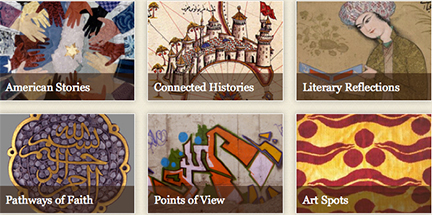
The National Endowment for the Humanities has a fantastic website on Islam with a variety of resources, especially valuable for teaching about Islam, but also just for browsing. The outreach part of the project is “The Muslim Journeys Bookshelf,” a collection of 25 books and 3 films, noted as “a collection of resources carefully curated to present to the American public new and diverse perspectives on the people, places, histories, beliefs, practices, and cultures of Muslims in the United States and around the world.” American libraries can apply for receipt of this collection. Available on the site are images, samples from texts, audio recordings and short film clips, web links and a bibliography.This website is worth spending a few hours on and coming back to; it is precisely what a virtual museum should be.
Here is a sample text excerpt to whet your appetite. This is from al-Jahiz, who died in 869 CE, on “The Disadvantages of Parchmentâ€
What is it to you that all my books are written on China paper or Khurasan paper? Explain why you have pressed on me the advantages of using parchment and urged me to write on hide, when you know very well that parchment is heavy and cumbersome, is useless if it gets damp, and swells in wet weather so much so that were its sole disadvantage to make its users hate rainy days, and its owners regard a shower as a nightmare, this alone would be reason enough for giving up the stuff. You know very well that on rainy days copyists do not write a single line or cut a single skin.
Parchment has only to get moist, let alone left out in the rain or dipped in water, for it to bulge and stretch; and then it does not return to its original state, but dries noticeably shrunk and badly wrinkled. What is more, it smells worse, is more expensive, and lends itself more readily to fraud: Wasit skins are passed off as Kufa ones, and Basra ones as Wasit ones. You are obliged to leave it to age in order to get rid of the smell and for the hair to fall out; it is fuller of lumps and flaws, more is wasted in scraps and clipping it turns it yellow sooner, and the writing very quickly disappears altogether. If a scholar wished to take with him enough parchment for his journey, a camel-load would not suffice, whereas the equivalent in qutni [cotton-fiber paper] could be carried with his provisions.
You said: “You should use parchment because it stands up better to scratching out and correction, and also to repeated borrowing and handling; then unwanted sheets are still worth something, palimpsests can be reused, and second-hand parchment does the same job as new. Writing-books of qutni are of little value on the market, even if they contain the most original texts, the choicest rarities and the most priceless learning. If you went to sell books of an equivalent number of parchment pages containing nothing but the feeble poetry and the idlest gossip, they would be in much greater demand.†And you added: “Hide is entrusted with the accounts of the administrative system, with title-deeds, diplomas, contracts and surveys; sculptors’ sketches are made on it, postal pouches are made out of and it is used for making bags, lids for jars and stoppers for bottles.†You did me a grave disservice when you made me take to using parchment instead of paper, and were the cause of my misfortune when you made me exchange light writing-books for volumes too heavy to hold, that crush people’s chests, bow their backs and make them blind.